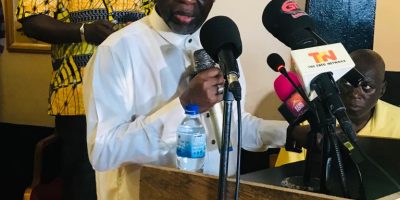 Alagi Yorro Jallow.
Alagi Yorro Jallow.
Fatoumatta: President Adama Barrow wants two or more terms in office like his two predecessors seeking to continue staying in power like some of the phenomena of “sit-tight” syndrome and tenure elongation African and some European leaders embrace. Adama Barrow has one already, which he says is not enough to birth the desired baby. So instead, he is demanding a second term of painful copulation.
President Barrow’s second term would likely be irreversible. It is more likely than most people think, and compared with his first term, its effect would be far more durable. As a result, president Barrow’s reelection seems implausible to many people, as implausible as his election did before December 1, 2016.
Power is a drug akin to an aphrodisiac requiring greater and greater doses of deference in terms of emoluments and plumage denoting high public office. The acclaimed American writer and public political biographer Robert Caro with pithy astringent elegance, stated, “power reveals.” President Adama Barrow, it appears from his lackluster performance in governance administration, has succumbed to this addictive narcotized nature inherent in power governance.
Politics is like romance. Governance has romantic attraction. It is not how long but how well. Sometimes it can be short and pleasant; it can also belong and awful. Whatever it is, there is a golden rule: Never assess actors based on the first experience. Some hit the ground running; some learn and improve on the job; some march, putting their gear in reverse mode. That is why unimpressed lovers ask for more and epileptic politicians seek to come back in repeated fits. They tell us to give them another chance; they say that the patient dog eats the fattest bone. They stop only at the bony part of the conversation. Whatever has happened to the meat is for their lordships’ mouths only. I am thinking of the recent demands for new terms and multiple sessions of involuntary love-making.
Fatoumatta: A University Professor in a given university competed for space with President Barrow. As Adama Barrow is playing Oliver Twist, asking for more than one term, the professor was negotiating for more than one session of sex with a female student. He broke the internet for demanding sex five times from a failure who needed his crutches. The professor said he would do one today, two tomorrow, one the day after, and another after the last act.
Furthermore, the exasperated lady asked: ‘is it food?!’ The nation heard the convo and crackled in sardonic laughter. One wrong session of sex is not enough for the don who would become Tortoise. A term is also not enough for the politician who has no idea of anything. The Tortoise was asked when he would stop his aimless, tasteless journeys; he replied that he would stop only when disgraced.
Asking for more has consequences. When Charles Dickens’ Oliver Twist asked, “Please, sir, I want some more,” what was the response he got? What he received was not the food he begged for; he got knocks and thrashings. Adama Barrow wanted a second term so that he could upgrade our failing country. A term is too short of making the Gambia great again, he claimed a few months ago. Once, just once, and no more, cannot be a heroic act. Not in politics. Not in the other room. The professor in the viral audio demanded the five sex terms to prove his seriousness to help the failed girl be at par with her successful mates. It is the same reason the politician tells us to vote him in again. He may have promised and failed to hit gold the first term, and the messiah still insists we need his help. The female undergraduate turned down the tonnes of sex her professor demanded and followed it up with an ocean of viral shame for the professor. The president asking for another term also flaunts the credentials of a messiah. Those are what his lovers see and fall for; only his wicked enemies see the failings of his years in the Statehouse.
Fatoumatta: Writing about a failed government in a failed nation repeatedly is terrible enough. It is the journalese version of the scriptural verses of lamentation. It is a chant of woes and its stale tales. What does it mean to tell stories of despair every week? The Tale of Woe is a 17th-century Russian story of disobedience, destruction, and redemption. It is a story “nourished by folk songs about woe and verse of repentance.” It says that misfortune and afflictions are not necessarily terminal where the sinner is penitent. Should not admittance of moral default followed by penitence precede a demand for a renewal of tenancy? Where a president promised job creation for unemployed youth but delivered a record of unemployment of children in history, how should the story be broken? Should the songs be of tears, rebuke, rejection, and ejection or praise and thanks to the midwife of stillborns?
Fatoumatta: Shouldn’t a man be bitter about all these warts around here? Should tales be of woes and misfortune with no redemptive window? I write about the Gambia and its fall in the vineyard. Like the Russian The Tale of Woe-Misfortune, the Gambian story is the story of Adam and Eve. Fallen and debased, the country may be in the jailhouse of its rapist leaders, but the good news is that it is not a condemned criminal. A change of moral direction will buy it its freedom from certain death. That is what the bard sings here as a regular brew of woes. And as a lecturer, I know that no one is so powerful as to mute the shrill of the gong of redemption, nor does crass noise kill the king’s market in its fullness. Should one stop thinking of why there is bad news everywhere here? Teachers demand of students not diligence at their studies but sex from age mates of their daughters; they demand not brilliance but tires from boys for the cars of the big bosses. Should one not ask why we do not think the suffering of the hungry must stop; why life always goes on here no matter the degree of injuries inflicted by the state; why our politicians always think of the next election even when the sky is crashing on the head of the poor? Should one stop asking whether it is the black man’s luck to remain as he has always been: retrogressive and, at best, stagnant?
The impotent man is Domorifoday; he must not eat spicy foods. He should not even be seen near the dining table. However, he is demanding it publicly here because around him are celebrators of impotence. I asked a friend if he also saw the tragedies all over. Yesterday, it was bandits and armed robbers; this year, today, it is bandits and robbers killing and stealing scores again. In the midst of all these, the elected leaders do not give a damn. The only damn they offer is the one that opens the second leg of power for them. Moreover, our conduct suggests to them that we do not have other options apart from them. Even the university girl that scored 33 percent had options. She rejected the thrusts of her professor and fought back with the sense of a woman. Failed politicians can ask for more, but the Gambian voter can also explore the options he has. He can sensibly use what he has to enthrone what he needs. Nevertheless, does the black man choose his leaders to be free from want and disease?
Fatoumatta: American statesman Thomas Jefferson, in his Notes on the State of Virginia’ (1787), says that the black man’s inferior mind is “a powerful obstacle to (his) emancipation.” The Gambian person can endure and excuse any pain. The black man’s raw courage, Jefferson says, “may perhaps proceed from a want of forethought,” which prevents him from “seeing a danger till it is present.” How could we fail to see this plain danger of today’s Gambia yesterday? As the curtain falls on one horrific scene, another scene of horror opens. And some of us are still not seeing anything. We still offer men without balls food which only the potent should eat. The developed world of the white man, which we love to visit and celebrate, was built on foundations of impotence?
And you ask: why is the black man blind to what is right? Is the black man doomed to self-destruct? Even on rare occasions, he manages to escape from the lion’s den, and he still goes back to pick his hat. The lion is begging him to do the same again on December 4. Here, the stars major in the harmful minors. The best things, when corrupted goes down below the worst. Could that be the reason a man who parades a Bachelor’s degree in Psychology, a Master’s in Psychology, an MBA, an MPhil, and a Ph.D. in Management Sciences would fall so pitiably at the feet of Viagra I university campus?
Fatoumatta: We may all be publicly condemning that professor and angry in self-righteous indignation, but how many who criticize him are better in conduct? Failed politicians who seek undeserved second terms are like that university girl. Voters who demand money to elect underserving politicians are doing precisely what that professor offered that girl. What about the politicians who sleep with favor-seeking female politicians? The female contractor who hawks sex from ministry to ministry? All others who daily do inappropriate things and play saint?
Our politicians are that failed student seeking a bailout. They die and insist they must pass, and some of us agree that they must pass. But, they will not stop insulting our sensibility quoting Oliver Twist asking for “some more.” They look down on us because the teacher who marks their scripts sleeps in their bed. And can we see that almost all of us are like that professor in self-destructive conduct?
Fatoumatta: Almost all are. We are, especially when we leave the right thing undone and insist we have done well and should be rewarded; when we demand the wrong thing from the right person; when the right thing goes from us to the bad person; when we abandon our marking scheme and impose non-answers as the requisite for a pass mark when we refuse to accept ‘enough’ as punctuation to our inappropriate conducts when we rush to offer condoms as a cure for erectile dysfunction. When we do all these, we sow fruitlessness into the soul of tomorrow.




Ma sha Allah great and thanks for sharing